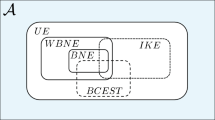Abstract
The agreeing-to-disagree theorem of Aumann and the no-expected-gain-from-trade theorem of Milgrom and Stokey are reformulated under an operational definition of Bayesian rationality. Common knowledge of beliefs and preferences is achieved through transactions in a contingent claims market, and mutual expectations of Bayesian rationality are defined by the condition of joint coherence,i.e., the collective avoidance of arbitrage opportunities. The existence of a common prior distribution and the impossibility of agreeing to disagree follow from the joint coherence requirement, but the prior must be interpreted as a ‘risk-neutral’ distribution: a product of probabilities and marginal utilities for money. The failure of heterogenous information to create disagreements or incentives to trade is shown to be an artifact of overlooking the potential role of trade in constructing the initial state of common knowledge.
Similar content being viewed by others
References
Aumann, R.: 1974, ‘Subjectivity and Correlation in Randomized Games’,J. Math. Econ. 1, 67–96.
Aumann, R.: 1976, ‘Agreeing to Disagree’,The Annals of Statistics 4, 1236–1239.
Aumann, R.: 1987, ‘Correlated Equilibrium as an Expression of Bayesian Rationality’,Econometrica 55, 1–18.
Bacharach, M.: 1985 ‘Some extensions of a Claim of Aumann in an Axiomatic Model of Knowledge’,J. Econ. Theory 37, 167–190.
Beja, Avraham: 1967, ‘Capital Markets with Delayed “Learning”.’ Ph.D. Thesis, Stanford University.
Cox, J. and Ross S.: 1976, ‘The Valuation of Options for Alternative Stochastic Process’,Financial Econ. 3(1/2), 145–166.
De Finetti, B.: 1937, ‘Foresight: Its Logical Laws, Its Subjective Sources’, Translation reprinted in H.E. Kyburg and H.E. Smokler (Eds.): 1980,Studies in Subjective Probability, Robert Krieger, New York, pp. 53–118.
De Finetti, B.: 1974,Theory of Probability, Vol. 1 Wiley, New York.
Drèze, J.: 1970, ‘Market Allocation Under Uncertainty’,European Econ. Rev. 2, 133–165.
Dupuy, J.P.: 1989, ‘Common Knowledge, Common Sense’,Theory and Decision 27, 37–62.
Gale, D.: 1960,The Theory of Linear Economic Models, McGraw-Hill, New York.
Geanakoplos, J. and Polemarchakis, H.: 1982, ‘We Can't Disagree Forever’,J. Econ. Theory 28(1), 192–200.
Goldstein, M.: 1983, ‘The Prevision of a Prevision’,J. Amer. Statist. Assoc. 78, 817–819.
Goldstein, M.: 1985, ‘Temporal Coherence (with discussion)’, in Bernardo, J., DeGroot, M., Lindley, D. and Smith, A. (eds.):Bayesian Statistics 2: Proceedings of the Second Valencia International Meeting North-Holland, New York, pp. 231–248.
Hacking, I.: 1967, ‘Slightly More Realistic Personal Probability’,Philosophy of Science 34, 311–325.
Harsanyi, J.: 1967, ‘Games with Incomplete Information Played by ‘Bayesian’ Players: I–III’,Management Science 14, 159–182, 320–334, 486–502.
Kadane, J. and Winkler, R.: 1988, ‘Separating Probability Elicitation from Utilities’,J. Amer. Statist. Assoc. 83(402), 357–363.
McKelvey, R. and Page, T.: 1986, ‘Common Knowledge, Consensus, and Aggregate Information’,Econometrica 54(1), 109–127.
Milgrom, P.: 1981, ‘An Axiomatic Characterization of Common Knowledge’,Econometrica 49(1), 219–222.
Milgrom, P. and Stokey, N.: 1982, ‘Information, Trade, and Common Knowledge’,J. Econ. Theory 26, 17–27.
Monderer, D. and Samet, D.: 1989, ‘Approximating Common Knowledge with Common Beliefs’,Games and Economic Behavior 1(2), 170–190.
Nau, R. and McCardle, K.: 1990, ‘Coherent Behavior in Noncooperative Games’,J. Econ. Theory 50(2), 424–444.
Nau, R. and McCardle, K.: 1991, ‘Arbitrage, Rationality, and Equilibrium’,Theory and Decision 31, 199–240.
Nau, R.: 1992a, ‘Joint Coherence in Games of Incomplete Information’,Management Science 38(3), 374–387.
Nau, R.: 1992b, ‘The Relativity of Subjective and Objective Correlated Equilibria’, Fuqua School of Business Working Paper 9102, December 1992.
Rubinstein, A.: 1989, ‘The Electronic Mail Game: Strategic Behavior Under Almost Common Knowledge’,Amer. Econ. Rev. 79(3), 385–391.
Rubinstein, A. and Wolinsky, A.: 1990, ‘On the Logic of “Agreeing to Disagree” Type Results’,J. Econ. Theory 51, 184–193.
Samet, D.: 1990, ‘Ignoring Ignorance and Agreeing to Disagree’,J. Econ. Theory 52, 190–207.
Savage, L.: 1954,The Foundations of Statistics, Wiley, New York.
Sebenius, J. and Geanakoplos, J.: 1983, ‘Don't Bet On It: Contingent Agreements with Asymmetric Information’,J. Amer. Statist. Assoc. 78(382), 424–426.
Smith, C.A.B.: 1961, ‘Consistency in Statistical Inference and Decision’,J. Roy. Stat. Soc. B 23, 1–25.
Tan, T.C. and da C. Werlang, S.R.: 1988, ‘On Aumann's Notion of Common Knowledge — An Alternative Approach’, CARESS Working Paper No. 88–09.
Werlang, S.R. da C.: 1987, ‘Common Knowledge’, in Eatwell, J., Milgate, J. and Newman, P. (Eds.),Game Theory: The New Palgrave., W.W. Norton, New York, pp. 74–85
Wilson, R.: 1968, ‘The Theory of Syndicates’,Econometrica 36(1), 119–132.
Author information
Authors and Affiliations
Rights and permissions
About this article
Cite this article
Nau, R.F. The incoherence of agreeing to disagree. Theor Decis 39, 219–239 (1995). https://doi.org/10.1007/BF01082053
Issue Date:
DOI: https://doi.org/10.1007/BF01082053




